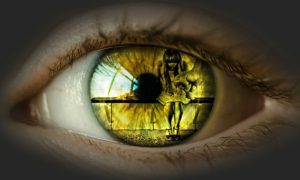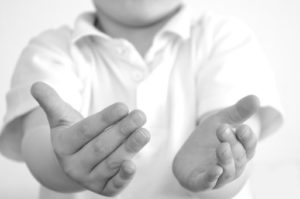Defne Dinler
 Living in a world of uncertainty, a world filled with violence and struggle, natural and human-made disasters, it can be easy to feel a sense of overwhelm and anger or perhaps a sense of collapse and helplessness in the face of such adversity. While some may set their feelings aside, maybe runaway by numbing out with food, drugs, alcohol, sex, etc., others may feel an intensity, a rage that compels them to fight against whoever or whatever stands in their way. Others may simply put their head in the proverbial sand or hang limp as if playing possum and yield to the dangers around them.
Living in a world of uncertainty, a world filled with violence and struggle, natural and human-made disasters, it can be easy to feel a sense of overwhelm and anger or perhaps a sense of collapse and helplessness in the face of such adversity. While some may set their feelings aside, maybe runaway by numbing out with food, drugs, alcohol, sex, etc., others may feel an intensity, a rage that compels them to fight against whoever or whatever stands in their way. Others may simply put their head in the proverbial sand or hang limp as if playing possum and yield to the dangers around them.
While anger can be motivating and used in both protective and destructive ways, I think helplessness and its sidekick powerlessness can be the scariest feelings for us to experience. They may startle us, lead us to feel the threat of imminent death while encircling us with a sense of powerlessness as if we have no power against our perceived threats.
Our response to either helplessness or powerlessness is rooted in our childhood experiences, in the patterns and survival skills we developed in response to situations within our primary relationships as well as other connections as we grew. When we were little and dependent on our caregivers, we may have felt physically helpless as well as emotionally helpless. Physical helplessness can involve feeling overpowered by someone or someone’s, which can be a terrifying threat. Emotional helplessness can be feeling as if we must be a certain way or do certain things to survive due to a potential threat of rejection, abandonment, betrayal etc. which leads to a place of physical threat for a child. Both experiences are painful and traumatic. They are also a part of human growth. These moments, if experienced in a supportive, attuned relationship can offer a great opportunity to truly grow and find our inner power as well as being able to tolerate these more intense emotions and be able to keep going.
When we experience pain/trauma, it often gets stuck in our body as an emotional blockage. The shock of the pain is stuck because we are unable to feel and work through the pain—we do not have the skills to contain it alone, to process it alone, to let it be and be done alone. We become terrified of feeling helplessness with good reason, and in response we often shut down or numb out to survive, or we find another survival skill to either escape from or wallow in the helplessness.
The advantage of growing up and becoming an adult is that we have more power and more independence than we had as a baby or a little child. We have more control over our lives. We may not feel like it at times but most of us do.
What happens in life is that we can become overwhelmed by our to-do list, by our responsibilities such as a new job/career, a new relationship or the end of a relationship, a new family, a death, a sickness etc. In response, we unconsciously go back to the childhood wound of helplessness. Because it’s a childhood wound, we can go into a victim place, or numb out, or have a temper tantrum like we might have had as a little kid.
When you feel helpless, what is your go-to reaction? Do you shut people out? Get dramatic about how bad your life is? Get needy? Stop everything and shut down? Get angry and have a fit?
The more you know about yourself, the more power you will have. We all have a survival skill—we figured out how to use this skill whenever we feel helpless throughout our lives. If you notice yours, you can notice when you’re in your reaction. Noticing means you reclaim your power. You can pause your reaction and take care of your younger self. From reaction to response. That’s where your healing happens. When it’s our inner world wanting to be rescued, we are our most powerful healers.
Can you be with your sense of helplessness? If tears come can you be with them? If anger comes, can you be with it without getting destructive? If you need some support, can you ask for it directly and from an adult place?
Often when we feel helpless, we may ask for help, but it can come from a young reactive place where we unconsciously push people away. When that happens, it becomes another self-fulfilling prophecy of, “I asked, and no one helped! I have no help.” We can be mean or yet at someone while indirectly asking for support. Notice how you ask for help. What you think is direct may or may not be, whether this is in your words or body language. Otherwise, you may have surrounded yourself with people who cannot or will not show up for you. How will you take care of yourself then? The more honest we are with ourselves the more powerful we are. We spend so much energy trying to convince ourselves of a reality we learned as children that we lose sight of what our true situation is as an adult.
We can feel helpless when a change to our life happens, like the examples I gave above, but we can also feel helpless in our daily routine of life. This is the one that creates our habitual complaints and habitual helplessness. If you think about it, why would anyone want to be in habitual helplessness? It’s a painful place to live in and most of us, if not all, do this.
What do you tend to complain about? A relationship, multiple relationships, family members, career, job, finances, physical issues, home issues, health? If you can be honest with yourself and name it, or have the courage to ask those you complain to what you complain about the most, you may find an amazing opportunity for personal growth, to feel your own power, to be empowered enough to break habits and take care of yourself the way you’ve wanted to be taken care of your whole life.
Would you be willing to take the risk to come out of a victim place and take ownership of your life? What would you have to lose? Your comfort zone?
You’ll be afraid. You can get support. You don’t have to do it alone. Find the person or persons who can support you through such a big change. You have potential for anything, to stay where you are, or to live the kind of life you want to. Any day, any second, the choice is yours.
In prior writings, I’ve mentioned my own inner temper tantrums and pain. When you can be honest with yourself, those parts stop having so much power over you. Life happens, we can go into that helpless place. It’s okay. We can also come out of that place. That gets to be the opportunity of personal growth. To be seen with my writings and my videos is a scary place for me. I choose to take the chance every single time. What do you do for yourself to come out of your comfort zone and fulfill your potential, break your victim and hiding habits, break your disconnection habits and allow for healthy connection and to be seen in your power and wisdom?
Contributor:
Defne Dinler, LPC







